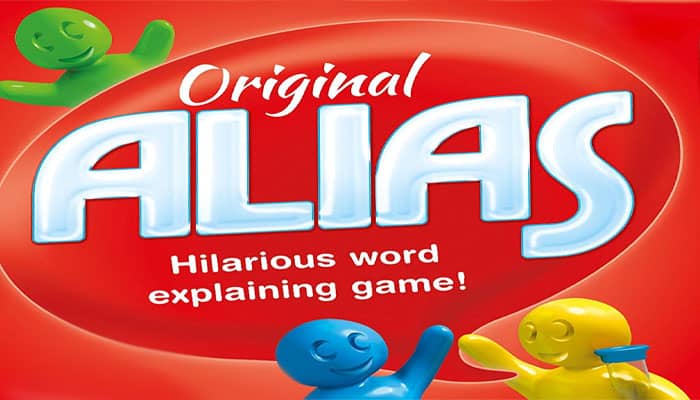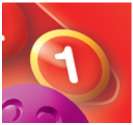

Components
- Game board
- 400 cards with 3200 words
- sand timer
- 6 game pieces
- Instructions
Object of the Game
Explain words using other words, synonyms or opposites! Try to get your partner or team to correctly guess as many words as possible before the sand in the timer runs out.
You can move your game piece forward on the game board as many steps as your team had correct guesses, and the team that's first to reach the finish space wins the game!

Game Play
-

Shuffle the word cards and place them in piles next to the game board. The players form teams of at least two people, and agree on the order the teams get to explain and guess.
Each team chooses a game piece and places it in the starting space.
-
The first team in turn decides which one of them will explain while the rest of the team will guess.
The explaining player picks up a stack of word cards. The words on the cards are numbered 1-8, so check the number on the space your game piece is stood on and explain the words of the same number on the cards.

Turn the sand timer and start explaining (see Explaining). Whenever the team gets a word right, the explaining player places the card on the table and begins to explain a new word of the same number from the next card.
The words have to be guessed completely right. If the word is "run", "running" is not accepted. If the word is "suspenders", "suspender" is not enough.
-
The other teams can monitor the timer. If the explaining player is still explaining a word when the time runs out, the other teams can also try to guess it. The fastest team wins the card and can move their game piece one step forward on the game board.
-
When the last word has been guessed, count together all the words the team guessed correctly. Count the mistakes and the skipped words as well - the team will have to move a step backwards for each mistake or skipped card (see Minus Points).
-
Now it's the next team's turn. The player who was the last to explain places the used cards in the bottom of the pack.
-
The role of the explaining player changes to the next player inside the teams on every turn.
-
The team that makes it to the finish space first wins the game - but the other teams still get to play their turn.

Explaining
There are all kinds of words on the cards - nouns, verbs, adjectives etc. The kind of words the team ends up explaining is random, and there are easier and more difficult words by each number.
You are not allowed to use any part of the word when you're explaining, nor a word that's partly the same.
For example the word "shoe string" cannot be explained by saying "the stringy thing you have on your footwear". You are allowed to say "the things you tie when you put on your footwear".
You can't explain the word "banker" by saying "someone who works in a bank", because the words "bank" and "banker" have the same stem.
With compounds the guesser usually gets half of the word right quickly. E.g. if the word you're explaining is "dogcatcher", the guesser might say "animal catcher".
Once the guesser gets half of the compound right (in this case the word "catcher"), the explaining player may use it to explain the rest of the word. If the guesser says any part of the compound, it can be used by the explainer. These rules also apply to phrases consisting of two or more words.
You can use opposites. The easiest way to explain the word "big" would be to say "the opposite of small".
Remember that you can't use a foreign language, unless all the players agree to it.
Minus Points

Remember to stay alert! If the explaining player accidentally says any part of the word, that team will have to take a step backwards on the game board.
If you come across a very difficult word, you can skip it, but each skipped word will result in a backwards step on the game board. Sometimes skipping a word might pay off, though, as you can easily get stuck on a tricky one.
While you're explaining, set the skipped cards in a separate pile. That will make scoring easier at the end of your turn.
If a team guessed seven words correctly, but they made one mistake and skipped two cards, they can move their game piece 4 steps forward on the game board (7- 1-2=4).
Stealing Words
If a game piece passes a stealing space, that team will have to play a stealing turn on their following turn. This means that all of the teams can guess and win cards.
This will happen regardless of whether or not the game piece ended up on the stealing space. It's the other teams' job to make sure they utilize the stealing opportunity.

A stealing turn is played without a sand timer. The team in turn takes 5 word cards and explains the words the usual way. The first team to get the word right wins the card, and 1 word equals 1 step forward on the game board.
At the end of every regular turn the other teams can also steal the last word if it's not guessed when the time runs out.
End of the Game
The game ends when the first team reaches the finish. This team is delcared the winner of the game.
Continue Reading


